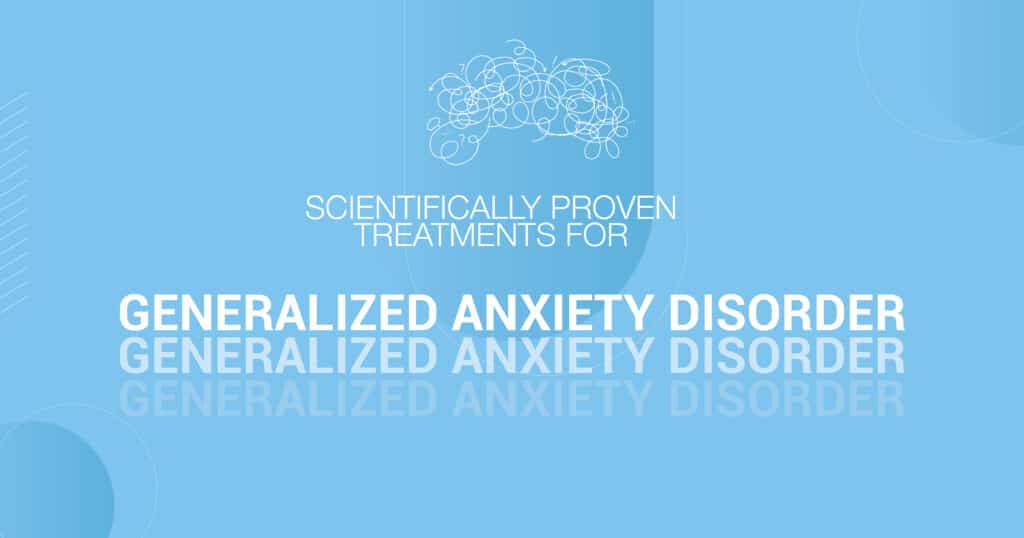Generalized anxiety disorder, commonly referred to as GAD, affects millions of people worldwide, causing persistent feelings of anxiety and worry that can interfere with daily life. While managing GAD can feel overwhelming, understanding scientifically proven treatments can provide a pathway to relief and improved well-being. In this comprehensive guide, we’ll delve into effective strategies supported by research to help individuals cope with and overcome the challenges of generalized anxiety disorder.
Understanding Generalized Anxiety Disorder: A Brief Overview
Before diving into treatment options, let’s briefly explore what generalized anxiety disorder entails. GAD is characterized by excessive worry and anxiety about various aspects of life, such as work, relationships, health, and everyday situations. Individuals with GAD often experience physical symptoms like muscle tension, restlessness, fatigue, and difficulty concentrating. These symptoms can significantly impact daily functioning and overall quality of life.
The Science Behind Generalized Anxiety Disorder
GAD is not simply a result of overthinking or a lack of willpower; it is a complex mental health condition influenced by a combination of genetic, environmental, and neurological factors. Research suggests that imbalances in brain chemistry, particularly involving neurotransmitters like serotonin and norepinephrine, play a significant role in the development and maintenance of GAD.
Scientifically Proven Treatments for Generalized Anxiety Disorder: Exploring Your Options
When it comes to managing GAD, a variety of evidence-based treatments have shown efficacy in reducing symptoms and improving overall well-being. Let’s take a closer look at some of these scientifically proven strategies:
1. Cognitive-Behavioral Therapy (CBT): CBT is a widely recognized and effective form of therapy for treating generalized anxiety disorder. This therapeutic approach helps individuals identify and challenge irrational thoughts and beliefs contributing to anxiety. Through techniques such as cognitive restructuring and exposure therapy, individuals can learn to modify their thinking patterns and behaviors, leading to a reduction in anxiety symptoms.
2. Mindfulness-Based Therapies: Practices like mindfulness meditation and mindfulness-based stress reduction (MBSR) have gained popularity in the treatment of anxiety disorders, including GAD. By cultivating present-moment awareness and acceptance, individuals can learn to observe their thoughts and emotions without judgment, reducing the grip of anxiety over time.
3. Medication: In some cases, medication may be prescribed to manage symptoms of generalized anxiety disorder. Selective serotonin reuptake inhibitors (SSRIs) and serotonin-norepinephrine reuptake inhibitors (SNRIs) are commonly prescribed antidepressants that can help alleviate anxiety symptoms by restoring neurotransmitter balance in the brain. It’s essential to work closely with a healthcare provider to determine the most appropriate medication and dosage for individual needs.
4. Lifestyle Modifications: Incorporating healthy lifestyle habits can complement other treatment strategies for GAD. Regular exercise, adequate sleep, balanced nutrition, and stress-reduction techniques like yoga or tai chi can contribute to overall well-being and resilience against anxiety.
5. Support Groups and Peer Counseling: Connecting with others who understand the challenges of living with GAD can provide invaluable support and encouragement. Support groups and peer counseling programs offer a safe space for individuals to share experiences, gain insight, and learn coping strategies from others facing similar struggles.
Additional Therapeutic Approaches for Generalized Anxiety Disorder
In addition to the core treatment modalities mentioned above, several emerging therapeutic approaches show promise in the management of generalized anxiety disorder. These include:
Acceptance and Commitment Therapy (ACT): ACT combines mindfulness-based techniques with behavioral strategies to help individuals accept their thoughts and feelings while committing to actions aligned with their values. By fostering psychological flexibility, ACT can empower individuals to live more fully despite their anxiety symptoms.
Biofeedback and Neurofeedback: These therapeutic techniques involve monitoring physiological indicators of stress and teaching individuals to regulate their bodily responses through relaxation techniques. Biofeedback focuses on physical measurements like heart rate and muscle tension, while neurofeedback utilizes EEG technology to train individuals to modulate brainwave activity associated with anxiety.
Dialectical Behavior Therapy (DBT): Originally developed to treat borderline personality disorder, DBT has shown efficacy in addressing emotion dysregulation and distress tolerance, common features of generalized anxiety disorder. Through a combination of individual therapy, skills training, and group support, DBT helps individuals build resilience and coping skills to manage intense emotions and reduce anxiety.
Frequently Asked Questions (FAQs)
Are there any natural remedies or supplements that can help with generalized anxiety disorder?
While some herbal supplements like passionflower, lavender, and chamomile have shown promise in reducing anxiety symptoms, it’s essential to consult with a healthcare professional before incorporating them into your treatment regimen. Natural remedies may interact with medications or exacerbate certain symptoms, so personalized guidance is crucial.
How long does it take to see improvement with treatment for GAD?
The timeline for improvement varies from person to person and depends on factors such as the severity of symptoms, the individual’s response to treatment, and consistency in implementing therapeutic strategies. While some individuals may experience relief within a few weeks of starting treatment, others may require several months to notice significant improvements.
Can generalized anxiety disorder be cured?
While there is no definitive “cure” for GAD, many individuals can learn to manage and minimize symptoms effectively through a combination of therapy, medication, lifestyle modifications, and support networks. With ongoing treatment and self-care practices, it’s possible to lead a fulfilling life despite living with GAD.
In Conclusion
In conclusion, effective treatments for generalized anxiety disorder exist, offering hope and support to those struggling with this challenging condition. By harnessing the power of evidence-based strategies like cognitive-behavioral therapy, mindfulness practices, medication, and lifestyle modifications, individuals can take proactive steps towards managing their symptoms and improving their quality of life. Remember, seeking help is not a sign of weakness but a courageous step towards reclaiming control over one’s mental health journey.








